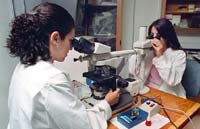The Profession
High Tech Applications of Biology, Chemistry & Medicine

Medical Laboratory Sciences include the areas of Hematology, Immunohematology, medical Chemistry, medical Microbiology, and medical Immunology. Practitioners are called medical Laboratory Scientists (MLS).
Medical laboratory scientists work to provide critical information needed for diagnosis, prognosis and management of disease. The work is of exacting precision and accuracy, and is performed in a fast-paced, highly technical environment.
Medical laboratory scientists examine and analyze blood, body fluids, tissues, and cells. They perform routine to complex chemical, biological, hematological, immunologic, microscopic and microbial tests, so they are required to have a strong background in biology, chemistry and medicine. In today's medical laboratory, a CLS is responsible not only for fast and accurate performance of lab tests, but also for quality control, quality assurance, medical relevance, infection control, cost effectiveness, revenue generation, and management of human resources.
Practice of the profession is regulated by a federal law entitled "The medical Laboratory Improvement Act" (CLIA) and laws of the state in which the laboratory is located. medical Laboratory Scientists are responsible for the accreditation of their laboratory as well as the laboratory's compliance with state and federal regulations. They often serve as consultants to smaller laboratories and physicians' office laboratories (POLs). Board certification as a medical laboratory scientist is a nationally recognized and highly marketable qualification for employment in a variety of organizations. In the State of Florida, laboratory personnel are required to be licensed by the State and to renew their license each biennium through documentation of continuing education.




